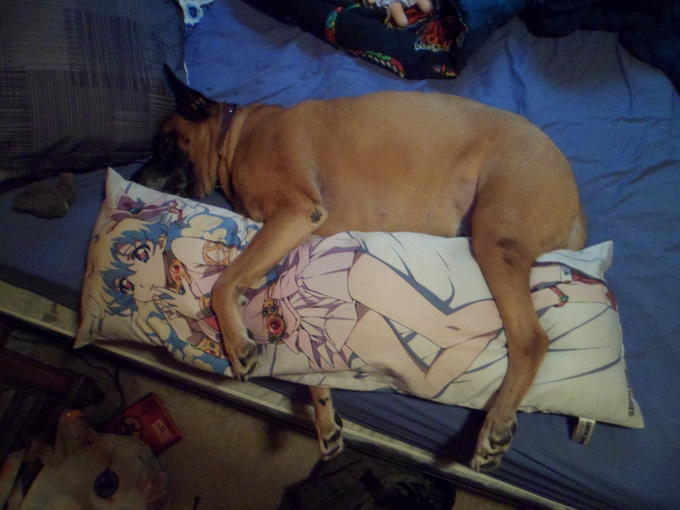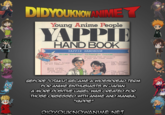Otaku
Part of a series on Anime / Manga. [View Related Entries]
[View Related Sub-entries]
About
Otaku (おたく/オタク) is a Japanese slang term used to describe someone who has obsessive interests in specialized subcultures and hobbies. While this is commonly used in regard to anime, manga, pop idols and video games, it can be extended to other subcultures as well. With the international success of Japanese cultural imports, the term has gained recognition among anime and manga fans overseas. In English, it is usually used to refer to an obsessive fan of anime, manga, video games and other Japanese culture, similar to weeaboo.
Online History
On October 1st, 2003, the site 4chan was created. In 2008, a sub-board called /jp/ for Otaku culture-exclusive discussion was added.[1] On April 7th, 2003, user death_to_all[3] submitted a definition for the word to Urban Dictionary [2] with over 8,000 upvotes in 8 years (shown below). The tag "Otaku"[4] also yields several results on the websites Tumblr, Twitter and Facebook.
Otaku is the honorific word of Taku (home).
Otaku is extremely negative in meaning as it is used to refer to someone who stays at home all the time and doesn't have a life (no social life, no love life, etc)
Usually an otaku person has nothing better to do with their life so they pass the time by watching anime, playing videogames, surfing the internet (otaku is also used to refer to a nerd/hacker/programmer).
In the Western culture, people confuse otaku to be something positive like "Guru". If you think about it, it's not really good to be called a guru if it means you are a total loser who can't socialize with other people except through the Internet.
Other Japanese words which have been confused by Westerners also include but not limited to: Anime, Manga, etc.
otaku no jinsei ha yabai na! (it sucks to live the life of an otaku!)
Reception
The reception of the word and culture is different depending on the country it is being used in. In Japan, Otaku culture is frowned upon, as staying inside obsessing over a hobby instead of going out and working or socializing with others is not seen to be proper behavior. However, in America it is often said with pride that someone has devoted themselves wholeheartedly to a hobby. In a way, "Otaku" has become an internet caricature that internet users can both exploit and embrace at the same time.
Weeaboo
Over time the term "Weeaboo" (a.k.a Wapanese) started to replace the word "Otaku" as an English slang to describe anime, manga and Japanese culture fans. However, the term is a more extreme form where the person being referred prefers Japan and all things in Japanese over one’s indigenous culture. The term is also a successive mutation of “Wapanese,” a derogatory slur referring to western Japanophiles with a strong bias towards Japanese cultural and tech imports.

Sub-Memes
Dinner with Waifu / Otaku Dates
Dinner with Waifu (Japanese: 嫁との晩餐, Yome To No Bansan), also known as “Otaku Dates”, refers to an annual event that takes place in Japan on Christmas Eve, and sometimes on Valentine’s Day. On either of these two days, users on the Japanese textboard 2channel share photographs of themselves enjoying dinner with their favorite anime character known as a waifu. The photographs typically show food placed in front of a monitor or body pillow with the character’s likeness on it.

Dakimakura / Body Pillow
Dakimakura (translated as “hug pillow” in English), also known as “Dutch Wife,” is a type of large pillow mainly used by the Japanese youth as a security object. While the bedding itself is not considered a sex object, the term has become closely associated with a subset of adult-themed “love pillows,” which feature life-size graphic prints of scantily-clad anime characters or adult film stars. Memes using 'Dakis' can range from using them in photos in funny circumstances, or cringe from seeing people holding them affectionately while outside in the real world.

Waifu
Waifu is an Engrish term primarily used by Asian men to refer to one’s own wife. While the colloquial use of the word in East Asian cultures predates its online popularity, the term has been since adopted by Otaku circles and anime fans to refer to one’s favorite female manga or anime character. The male equivalent is commonly referred to as a “Husbando' and in-fighting within the Otaku community over which Waifu or Husbando is the best one is nearly constant.

Ken-Sama
Ken-Sama is a fictional character originating from a copypasta story about an adult American male obsessed with Japanese and Otaku culture. Commonly paired with a picture of an adult male wearing a Kimono, the character can be seen as a caricature of Japanophilia and the Weeaboo subculture in particular. Since first appearing on 4chan in 2009, it has inspired several variations that were supposedly written by people obsessed with foreign cultures in the style of the Ken-Sama story.

Search Interest
External References
[3] Urban Dictionary – User death_to_all
[4] Tumblr – Search term '#Otaku'




![This time on Law and Order: SVU.... New Episode of Law and Order: SVU Focuses on Otaku Culture ubespongecake We're finally killing animé fourofthem #0ce T voice] they're called weaboos hellionesque diD YOU ACTUALLY READ THE ARTICLE THOUGH IT'S THE FUNNIEST S--- The most recent episode of the NBC crime drama Law and Order Special Victims Unit has touched off intense discussion in the anime community. The episode, titled "Loliconvict, featured detectives Benson Mariska Hargitay) and Tutuola (Ice-T) pursuing an illicit doujinshi ring The episode takes the detectives to an anime convention where they attend a boring panel discussion on the topic what the hell is moe, anyway?, and to several basements packed to the rafters with idol figures and dakimakura Throughout the episode, the agents crack down on otaku and the recent "moe phenomenon, hinted to be synonymous with child ponography. Otaku, the episode explains, are dangerous reclusive criminals who peddle explicit cartoons. Agent Tutuola apprehends one otaku early in the episode and uncovers his harem of wives (known as waifu) before remarking that the man's waifu were "s---. Agent Tutuola apprehends one otaku early in the episode and uncovers his harem While many members of the anime community criticized the episode for inaccurately portraying anime fans episode was carefully researched Our writers spent hours poring over Anitwitter, /al, and several major anime websites in order to make the episode as believable as possible,' episode director Waren Leight told Anime Maru In one scene, Detective Tutuola says that he read on ANN that Kirino was, in fact, best Orelmo. That's actually something we really saw on that website. See what I mean? We are committed to being authentic. Chare thie](https://i.kym-cdn.com/photos/images/list/001/281/908/370.png)















